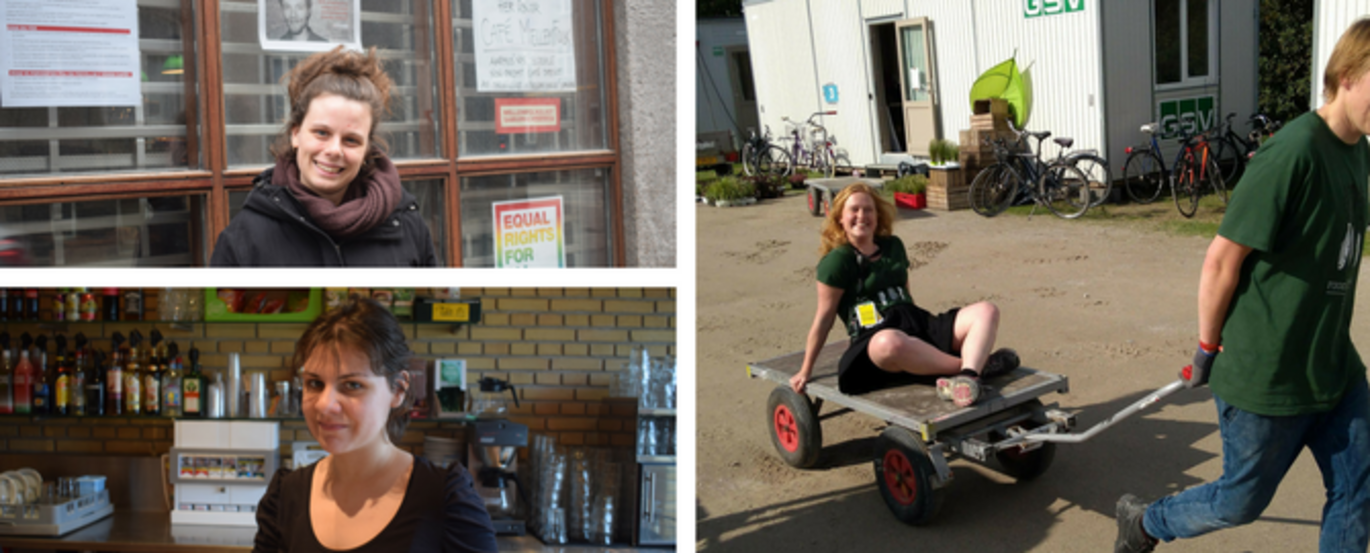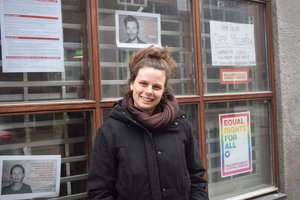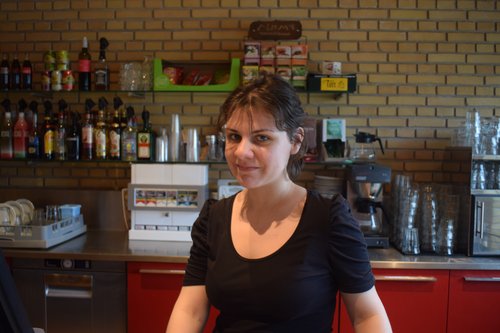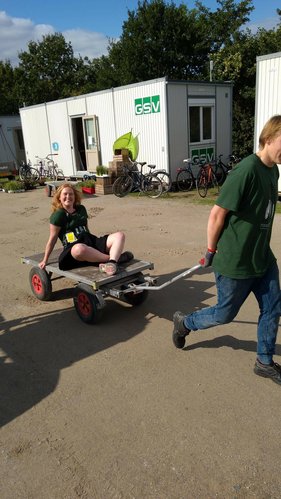Volunteering: Why work for free?
Volunteer work is rooted deeply in Danish society. Thirty-five per cent of the Danes do volunteer work. But what drives people to spend time and energy on unpaid jobs?

How to become a volunteer yourself
It can be hard to find the right volunteer position. But there are different possibilities to help you find the right volunteer position for your interests and expectations – whether you are an international or a local.
The Volunteer Center Aarhus facilitates networks between NGOs, the public administration and private companies, conducts workshops and classes for volunteers and helps guide you through the many volunteering opportunities in Aarhus.
Volunteering.dk is part of Denmark’s volunteer database frivilligjob.dk and is for volunteers and organisations with an international background.
The job and project database at Aarhus University helps you to find the right kind of job for your skills and needs. You can select your field of studies, language skills, location and what kind of job you are looking for, from voluntary work to fulltime positions.
The MellemFolk Café keeps its work in English to provide an international platform. The minimum requirement to work at the café is three shifts per month, with each shift lasting four to five hours. More information about the non-profit organization can also be found on Facebook.
Studenterhus Aarhus offers several opportunities for volunteer work: business, culture, marketing, the international group, the bar group and as a team leader.
The street of Vestergade is filled with cafés, restaurants and boutiques, and soon a new location will open its doors: Café MellemFolk.But unlike most of the other places, the café is built and run by volunteers.
This is not unusual in Denmark, where there is a strong tradition for volunteering. According to the Ministry of Foreign Affairs, 35 per cent of the Danes do volunteer work in one of the over 100,000 volunteer organisations in the country.
READ MORE: “Control is good, but trust is cheaper”
For the past months, Café MellemFolk has been under construction. The dusty windows have been covered in paper: advertisements, announcements, invitations. All for one cause: To promote the non-governmental organisation Mellemfolkeligt Samvirke (MS), the Danish branch of the international relief organisation ActionAid. With offices in over 45 countries, the NGO aims to tackle poverty and injustice.
“With the café, the volunteers of MS want to gather people to learn more about the projects of the NGO, but also to have fun and enjoy the commodities of a normal café,” says Katrine Jørgensen. The 25-year-old political science student is the local coordinator of Mellemfolkeligt Samvirke.

Around 200 people have been involved in building the café for almost a year now. Most are volunteers – but some money had to be spent on professionals. Right now, for instance, the final steps of soundproofing the café are being done by experts. On 26 May, MellemFolk Café will celebrate its opening.
Once the café is up and running, groups of volunteers will serve coffee and beers, fundraise and do event campaigning. Café MellemFolk has received money from the Copenhagen office to kick start the café. Once it is self-sufficient, profits will be donated to a project in El Salvador.
Katrine Jørgensen’s job mostly entails making sure the other volunteers are happy. When people don’t get paid for their work, appreciation must be shown by other means. “It is important to make people feel like they are being acknowledged,” Jørgensen says. To do so, she makes sure that dinner is prepared at the monthly meetings of Café MellemFolk, that the volunteers have get-togethers and parties, and that workshops are organised to foster their skills.
“I get way more back than I give”
Appreciation and recognition is exactly why journalism student Anna Kate Artioli loves being a volunteer at Studenterhus Aarhus: “I get way more back than I give.” Since December, the 25-year-old Italian has been working as a bartender at the Studenterhus Aarhus, around 18 hours a month. “We are not paid, but there are perks to the job.” Drinks and snacks are free during shifts, and volunteers get discounts on the trips Studenterhus Aarhus organises. Aside from that, Studenterhus Aarhus offers events and dinners exclusively for the volunteers.

When she started her Master’s degree in Aarhus last September, Artioli hesitated to take on volunteer work because she wanted to focus on her studies. The winter break made her reconsider, since she felt alone and down over the holidays in Aarhus – so she signed up to help with the Christmas dinner for international students. “The Studenterhus has such a nurturing, positive environment. People are here because they want to be here. It is the perfect antidote for sadness.”
Apart from the social network, Artioli sees the volunteer work as an opportunity to extend her entry level job experience. The job is proving to be valuable on several levels, she says: “I get work experience as well as I show that I am a caring person because I work for free.”
But why are the students not getting paid for their work? “Because payment is not the idea of the Studenterhus Aarhus,” Thomas Moeslund says. The head of communications explains that being at the Studenterhus Aarhus is about the learning aspects; students come to develop social skills and gain work experience. “Also, we would close pretty soon if we had to pay all of the 180 volunteers.” However, the bar in the basement is run by students who are paid for their work. “We have different demands for the bar downstairs. We serve more than 250 beers and the students have to take over more shifts.”
Positive impact on future career
“I believe that the impact of volunteering is very positive,” Anne Louise Møller says, who is a career counselor at the Faculty of Arts. “The skills you obtain depend very much on the job you choose. But generally, you get to know other people, build a network, develop new competencies and have the chance to try out new things.”
Aside from that, it has a positive effect on one’s studies. “You get to try out theories in practice and bring that experience back to the studies,” Møller says. “You get perspectives on both sides.” Anne Louise Møller wouldn’t necessarily distinguish between the impact of volunteer work and student jobs: “It’s both experience.”
Volunteer with a huge responsibility
This is also what Ellen Emilie Madsen, a student of political science and the study of religion, has experienced. Last year, she worked as the volunteer coordinator at the Aarhus Food Festival – also an unpaid position. During her six months of internship, Madsen had to find all the volunteers needed for the three-day-festival in September, coordinate their positions and take care of their needs. “It was entirely my project, I only had to answer to the top boss,” Madsen says. “I really loved the responsibility, that’s why I chose it.”

The 25-year-old took half a year off from her studies to get some work experience. “I learnt so much: That I am able to do such a big project on my own, I got reconfirmed in my people skills and that I can handle pressure.”
When asked whether she thinks it is fair not to get paid for her work, Madsen responds that she thinks volunteer work is a milder, easier transition into the labor market in comparison to paid student jobs. “When you do volunteer work, your employer really appreciates you and is grateful.” Madsen says her internship was the ideal workplace: daily homemade lunch, monthly Friday bars and other get-togethers, like an Easter lunch. “They really went out of their way and did a lot of things to make us feel appreciated.”
What’s the motivation?
Madsen’s main motivation for the internship was gaining experience. “This position was not about going home and feeling good because I have helped someone else.” Nonetheless, she said it was great experience to be part of the City of Aarhus and to contribute to making the biggest food event in Scandinavia work.
Katrine Jørgensen on the other hand says her biggest motivation to work at Café MellemFolk is the feeling of doing something good. “You can’t change the world but you can make sure that people are informed about the world.”
How to become a volunteer yourself
It can be hard to find the right volunteer position. But there are different possibilities to help you find the right volunteer position for your interests and expectations – whether you are an international or a local.
The Volunteer Center Aarhus facilitates networks between NGOs, the public administration and private companies, conducts workshops and classes for volunteers and helps guide you through the many volunteering opportunities in Aarhus.
Volunteering.dk is part of Denmark’s volunteer database frivilligjob.dk and is for volunteers and organisations with an international background.
The job and project database at Aarhus University helps you to find the right kind of job for your skills and needs. You can select your field of studies, language skills, location and what kind of job you are looking for, from voluntary work to fulltime positions.
The MellemFolk Café keeps its work in English to provide an international platform. The minimum requirement to work at the café is three shifts per month, with each shift lasting four to five hours. More information about the non-profit organization can also be found on Facebook.
Studenterhus Aarhus offers several opportunities for volunteer work: business, culture, marketing, the international group, the bar group and as a team leader.

